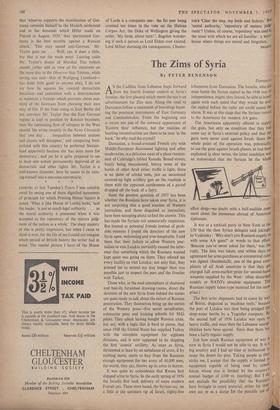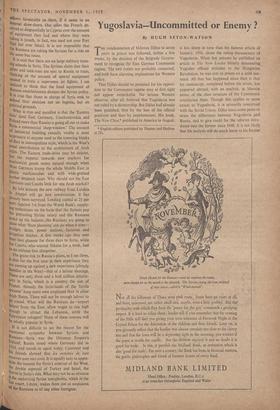The Zims of Syria
By PETER BENENSON AS the Cadillac from Lebanon leaps forward from the fourth frontier control at Syria's frontier, the first placard which meets the eye is an advertisement for Zim cars. Along the road to Damascus follow a succession of hoardings boost- ing the precision instruments of East Germany and Czechoslovakia. From the beginning one is aware not just of the outward appearance of 'Eastern bloc' influence, but the realities of bustling reconstruction are there to be seen 'in the book.' So why read the crystal?
Damascus, a broad-avenued French city with Middle-European fluorescent lighting and other modernities, is a delicious oasis of a place reminis- cent of Coleridge's fabled Xanadu.' Broad streets, busily being macadamed, betray none of the bustle of other Arab cities; traffic is light; there is no show of armed men, just an occasional covered-up light artillery gun on the roadside is there with the apparent carelessness of a parcel dropped off the back of a lorry.
Since the greatest question of 1957 has been whether the Russians have taken over Syria, it is not surprising that a good number of Western journalists, and those disguised as journalists, have been snooping about to find the answer. This has made the Syrians not unnaturally suspicious.
But treated as potential friends instead of prob- able enemies I found the directors of the new Syria open, welcoming and over-hospitable. I told them that their failure to allow Western jour- nalists to visit Latakia inevitably caused the infer- ence that something which the Russians wanted kept quiet was going on there. They offered me every facility-to visit Latakia; not only that, they pressed me to extend my stay longer than was possible just to inspect the port and the frontier with Turkey.
Those who, in the cool atmosphere of shuttered and heavily furnished drawing-rooms, direct the destinies of the new Syria from behind the scenes are quite ready to talk about the extent of Russian penetration. They themselves bring up the stories of the Western press—five secret aerodromes, submarine pens and training schools for MiG pilots. They admit having bought Russian arms, but say, with a logic that is hard to pierce, that since 1948 the United States has supplied Turkey with the complete equipment for eighteen divisions, and is now supposed to be shipping the first 'atomic' artillery. As soon as Syria, threatened at least by an unbalance of arms, if by nothing more, starts to buy from the Russians enough equipment for her army of 44,000 men, the world, they say, throws up its arms in horror.
It was quite by coincidence that Russia first shipped arms to Syria. In the early spring of 1956 the Israelis first took delivery of some modern French jets. These were based, the Syrians say, on a field at the northern tip of Israel, eighty-five Dara.seur kilometres from Damascus. The Israelis, who did once bomb the Syrian capital in the 1948 war 01 independence, might, they feared, be able to bomb again with such speed that they would be over the capital before the radar net could sound the alarm. It was at this stage that the Syrians turned to the Americans for modern AA guns.
The Americans apparently offered to supPlY the guns, but only on condition that they had some say in Syria's external policy and that the guns were never used against Israel. Since the whole point of, the operation was, potentially' to use the guns against Israeli planes, as had been explained in clear terms, the latter condition was so nonsensical that the Syrians let the whole affair drop—no doubt with a half-audible corn' ment about the innocence abroad of American diplomats.
It was at a cocktail party in New York at the UN that the then Syrian delegate said jokinglY to Vyshinsky : 'Why don't you Russians supply us with some AA guns?' or words to that effect. 'Because you've never asked for them,' was the reply. The hint was taken, and within days an agreement for arms purchases at commercial rates was signed. (Incidentally, one of the great com- plaints of all Arab countries is that they get charged full arms-market-price for second-hand weapons supplied by the West : often discarded models or NATO's obsolete equipment. The Russians supply latest-type material for the same price.) The first arms shipments had to come by waY of Beirut, disguised as 'machine tools,' because the port of Latakia was then being dredged fat deep-water berths by a Yugoslav company. BY the second half of 1956 Latakia was open to heavy traffic, and since then the Lebanese susceP' tibilities have been spared. Since then there has been a fairly regular supply. Just how much Russian equipment of war i5 now in Syria I would not be able to say. It is 3 big country and I had no time or inclination to scour the desert for pins. Taking people as 00 strike me, I accept that the supply is limited to equipment capable of being used by armed forces whose size is limited by the country s annual budget of £100 m. (sterling). But I do not exclude the possibility that the Russians have brought in more material, either for the Own use or as a dump for the possible use of officers favourable to them, if it came to an internal show-down. Our allies the French de- ceived us disgracefully in Cyprus over the amount of equipment they had and where they were taking it (much, in fact, was used not over Port Said but over Sinai). It is not impossible that the Russians are taking the Syrians for a ride on the same bus route. It is said that there are no large military train- ing schools in Syria. The Syrians claim that their plots and tank-men are sent to Russia to train; thinking of the amount of special equipment needed to train a supersonic jet fighter, I am inclined to think that the fixed equipment of Russian establishments dictates the Syrian policy. It is true that those in charge of Syria seek to defend their decision not on logistic, but on Political grounds. What is true and manifest is that the 'Eastern bloc' (and East Germany, Czechoslovakia and Poland more than Russia) is going all out to make SYria a commercial 'shop-window.' The amount of industrial building casually visible is most impressive to anyone used to the towering blocks of flats in cosmopolitan style, which is the West's usual contribution to the architecture of Arab cities. The Eastern trade-drive may be sinister, but the impetus towards new markets for mechanical goods seems natural enough when West Germans tramp the whole Middle East in Plastic mackintoshes and with wide-grained leather despatch cases. Why should not the East Germans and Czechs look for one Arab market?
By late autumn the new railway from Latakia to Aleppo will go into construction; it has already been surveyed. Lending capital at 2+ per Cent. (against 5-6 from the World Bank), supply- ing technicians on the basis that the Syrians pay the prevailing Syrian salary and the Russians Make up the balance, ,the Russians are going to show what 'State planning' can do when it tries— bridges, --ges, dams, power stations, factories and irrigation ditches.. A few weeks ago they sent their best planner for three days to Syria, while the Czechs, who wanted Nikitin for a week, had to do without him altogether. The grave risk to Russia's plans, as I see them, is that for the first time in their experience they are coming up against a new experience (already familiar in the West)—that of a labour shortage. There are only three and a half million : inhabit- ants in Syria, which is a country the size of Prance. Already the farm-lands of the 'fertile crescent' keep more men employed than in other 'ab States. There will not be enough labour to go round. What will the Russians do—imporl labour from the East, allow wages to rise high enough to attract the Lebanese, settle the Palestinian refugees? None of these courses will be wholly popular in Syria.
It is not difficult to see the reason for the emotional sympathy between Syrians and Russians—Syria was the Ottoman Empire's Ireland; Russia stood where Germany did in 1914, and stands so again today. Casement and his friends showed that les ennemis de rtes ettnentis sont tees amis. It is equally easy to appre- ciate the reasons for Syria's mistrust of the West, the double espousal of Turkey and Israel, the thorns in Syria's side. What may not be so obvious is the underlying Syrian xenophobia, which in the last resort, I think, makes them just as suspicious Of the Russians as of any other foreigner.

































 Previous page
Previous page